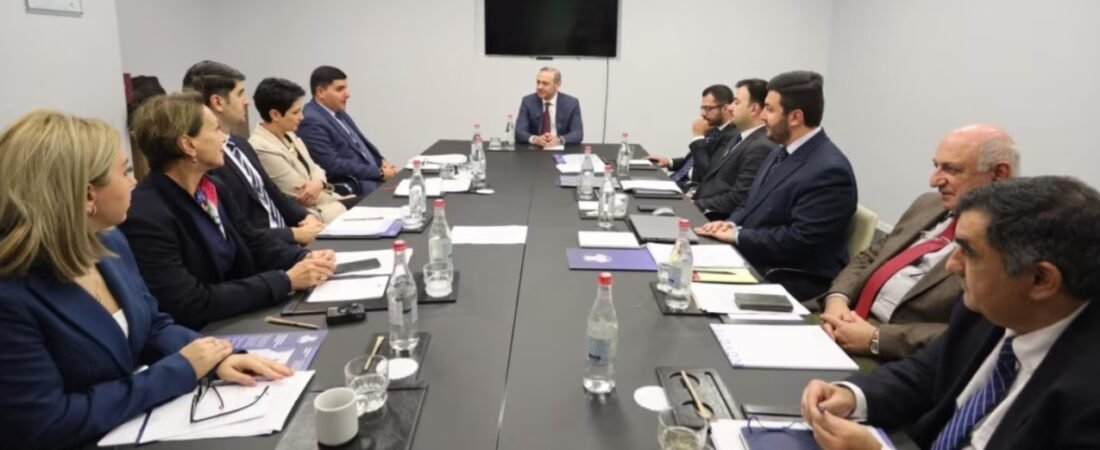Photo caption: Meeting of Armenian and Azerbaijani experts with the Secretary of Armenia’s Security Council, Armen Grigoryan — October 22, 2025.
During their meeting in Yerevan with Azerbaijani counterparts, Armenian experts expressed a desire to meet Armenian prisoners of war while in Baku, Boris Navasardyan — Honorary President of the Yerevan Press Club and head of the Media Ethics Observatory — told “Azatutyun” (RFE/RL’s Armenian Service).
“Once we are there, I think it will become clear what kind of response our request has received,” Navasardyan said.
Although Armenia and Azerbaijan have both announced that peace has been established, Baku continues to hold 23 Armenian prisoners in its jails. When Armenia’s National Security Service chief visited Baku in September, there had been an expectation that Andranik Simonyan would at least meet the Armenian captives, but no such information was reported.
“Our wish is obvious, and naturally it has been voiced. But we understand that this is not an issue to be decided by those who have visited Yerevan. Still, through them, our intention — to use the visit to Baku also for this purpose — has been conveyed. As for how it will turn out, I think we won’t know until just before our departure,” said the honorary president of the Yerevan Press Club.
At the start of the week, Secretary of Armenia’s Security Council Armen Grigoryan announced that representatives of Armenian civil society would soon make a reciprocal visit to Baku. The Azerbaijani delegation had been in Yerevan on October 21–22. As for the exact date of the trip to Baku, Navasardyan said the timing would only become clear at the last moment.
However, according to Navasardyan, the issue of prisoners and missing persons remains on their agenda — alongside discussions about signing a peace treaty as soon as possible, accelerating the process of unblocking regional connections, launching joint economic projects, and initiating contacts between border communities. Without giving details, he said that joint proposals had also been drafted on these issues.
“The proposals we developed, I think, could to some extent be incorporated into the official negotiation agenda, and for me that was the main purpose of this meeting,” the honorary president emphasized.
The Armenian-Azerbaijani meeting in Yerevan was controversial: among the participants was a woman who had taken part in blocking the Lachin Corridor in December 2022, as a representative of Azerbaijani civil society. The closure of the corridor was followed by months of blockade and ultimately the depopulation of Nagorno-Karabakh.
Areg Kochinyan, one of the Armenian participants, said that with the support of officials from Yerevan and Baku, both sides selected their own participants independently and did not coordinate lists.
International reports have also noted that genuine civil society does not exist in Azerbaijan — the organizations that operate there are under government control, and dissenting voices are suppressed.
“Azatutyun” asked Navasardyan whether he saw a genuine interest in solving problems, or whether the Yerevan meeting had been merely formal.
“As for those ten people in particular, the main thing that unites them is that both sides support the peace agenda currently being implemented. There may be certain changes or adjustments in how it’s carried out, but overall, we agreed that we support that agenda,” said Navasardyan.
Five people from each side took part in the discussions. Navasardyan assumed that the same group would travel to Baku, though he mentioned there had been a proposal to expand the circle of participants to include organizations working in specific fields.
Foreign Minister Ararat Mirzoyan also hinted today at possible reciprocal visits by journalists, responding to a question from an Azerbaijani journalist who had come to Yerevan. However, he did not clarify when Armenian journalists might visit Azerbaijan, how many would go, or under what framework.
As for the civil society visit, Navasardyan assumes that — as was the case with the Azerbaijanis — their trip to Baku will also be organized via a direct flight.

